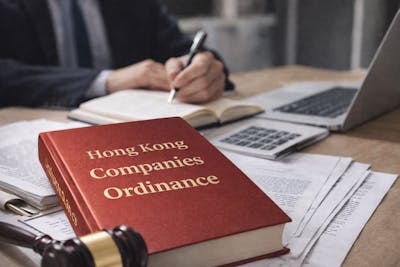The benefits of declaring a company dormant include reduced costs and formalities, preservation of the legal entity for future use, better assets protection, and it is easier than deregistering the company.
Compared to an active company registered in Hong Kong, a dormant company has reduced compliance burdens, as it is exempt from several annual filings, statutory audits, and holding annual general meetings, but it must renew its Business Registration yearly.
Opting for dormant status is an effective way to protect existing assets and intellectual property rights during periods of inactivity.
Often, businesses become dormant due to inactivity, but not everyone understands the responsibilities involved. This article explains what a dormant company is and guides you on how to become one.
What Are Dormant Companies?
A dormant company in Hong Kong is a private limited company that has no accounting transactions during its financial year, except for transactions required by law, such as government fees.
Under Section 5 of the Companies Ordinance (Cap. 622), a company is officially considered dormant only after filing a special resolution with the Companies Registry.
Simply ceasing business activity is not enough. Legal dormancy requires a formal declaration.
Also note:
- Legal dormancy is recognized by the Companies Registry.
- Tax dormancy is recognized by the Inland Revenue Department.
These are separate. To gain full exemptions from audits and tax filing, both must be met.
Legal Dormancy vs. IRD Dormancy
| Aspect | Legal Dormancy | IRD Dormancy |
|---|---|---|
| Governing Body | Companies Registry | Inland Revenue Department (IRD) |
| Legal Basis | Companies Ordinance | Inland Revenue Ordinance |
| Definition | Company is not engaging in any business or accounting activity | Company has ceased business and applies to IRD for exemption from tax filings |
| Effect | Company remains registered but is exempt from preparing audited accounts | If approved, IRD will stop issuing Profits Tax Returns |
| Automatic? | Yes, upon proper filing with Companies Registry | No, must formally apply with a No Objection Letter |
| Application Required? | File a special resolution and relevant forms with the Companies Registry | Submit a written request with supporting documents to the IRD |
| Ongoing Obligations | Must still file Annual Return and pay Business Registration fee | If approved, no need to file Profits Tax Return until business resumes |
| Reactivation | Must notify Companies Registry and resume accounting activities | Must notify IRD and resume filing tax returns |
| Risks if Ignored | Late filing penalties from Companies Registry | Estimated assessments, penalties, and potential IRD investigations |
Benefits of a Hong Kong Dormant Company
The key advantages of declaring a company dormant include:
1. Reduced Costs and Formalities
Compared to an active company registered in Hong Kong, a dormant company doesn’t need to:
- File annual returns (Form NAR1)
- Prepare audited financial statements
- Submit profits tax returns
- Hold annual general meetings
You still need to renew your Business Registration Certificate every year. Dormant status doesn’t exempt you from that.
2. Preservation of Legal Entity for Future Use
The company remains registered and can be reactivated at any time via a special resolution. It’s more efficient than deregistering and incorporating again later.
3. Better Assets Protection
Opting for a dormant status is a great way to protect its existing assets and intellectual property rights during the period when it is inactive.
4. Easier Than Deregistration
If it is just temporary, then do not deregister your company. Dissolving a company involves more procedures and costs.
Dormancy offers an easier alternative if business cessation is temporary.

What Companies Are Not Allowed to Claim Dormant Status?
Not all registered businesses in Hong Kong can become dormant companies.
Only private companies are allowed to be dormant. If you are not a private company, the relevant provisions of the Hong Kong Companies Ordinance that allow an entity to become dormant do not apply.
Certain companies, as specified in Section 5, Sub-section 7 of the Hong Kong Companies Ordinance, are ineligible for dormant status.
As they handle financial assets, they must remain active and engage in accounting transactions. These include:
- Financial institution under the Banking Ordinance
- Insurer under Insurance Companies Ordinance
- Corporations licensed under the Securities and Futures Ordinance
- Associated entities under the Securities and Futures Ordinance of a corporation in paragraph (3)
- Approved trustees of the Mandatory Provident Fund Schemes Ordinance
- A subsidiary of a company that falls within paragraphs (1), (2), (3), (4), or (5)
- A company that falls within (1), (2), (3), (4), (5), or (6) at any time during the 5 years immediately before the special resolution for claiming dormant status is passed
The financial secretary of Hong Kong is at liberty to amend the list above and add more companies that cannot claim dormant status.
Permitted Transactions for Dormant Companies
If your company is dormant under Hong Kong law, you’re only allowed to carry out specific types of non-financial activity.
Allowed transactions include:
- Paying government fees (e.g., Business Registration renewal)
- Maintaining registered office
- Filing changes to directors, shareholders, or address
- Allotting shares
- Updating the Companies Registry
These actions are necessary to keep your company in good standing, even while it’s dormant.
Prohibited Transactions
The moment your company enters into an accounting transaction, dormancy ends automatically.
That includes:
- Receiving income
- Paying business expenses
- Transferring funds
- Issuing invoices
- Earning bank interest
Any of these will terminate dormant status and trigger full compliance obligations again.
How to Apply for Dormant Company Status in Hong Kong

If you're ready to pause your Hong Kong company’s operations, you must officially declare dormancy through the Companies Registry. Here’s exactly how to do it — step by step.
Step 1: Hold a Board Meeting
Start by calling a board meeting with the directors. The purpose is to approve the decision to make the company dormant and prepare the required resolutions.
Step 2: Pass a Special Resolution
You must pass a special resolution stating that the company intends to become dormant under Section 5 of the Companies Ordinance.
This resolution must be approved by at least 75% of shareholders.
Use the official wording suggested by the Companies Registry (see specimen resolutions A1 or A2 for reference).
Step 3: File the Resolution
The company directors must file the special resolution with the Companies Registry within 15 days of passing the special resolution.
The company becomes a dormant company on:
- The day the special resolution to the Registrar of Companies is delivered; or
- Any other date specified in the special resolution.
If the resolution is filed after the 42nd day from your incorporation anniversary, you must still file that year’s annual return.
Annual Compliance Requirements While Dormant
Dormant companies are exempt from many filings but still must:
- Have a registered office address, at least one shareholder, an individual director, and a company secretary
- Report any changes to company structure/appointment of director or company secretary to the Companies Registry;
- File for renewal of the company's Business Registration Certificate (BRC); and
- Submit any Profits Tax Return received by the Inland Revenue Department (if any — which shall normally not be the case)
How to Reactivate a Dormant Company in Hong Kong

If your company is ready to resume business in Hong Kong, you must formally reactivate it. This means notifying the Companies Registry and ending its dormant status. Here’s how to do it step by step.
Step 1: Pass a Special Resolution
To end dormancy, the company must pass a special resolution declaring its intention to resume business or enter into an accounting transaction.
Use the standard format (specimens B1 or B2) as outlined in Section 5 of the Companies Ordinance.
Step 2: File the Resolution with the Companies Registry
Submit the signed resolution to the Companies Registry for registration.
Dormancy ends either:
- On filing date, or
- On the date of the first accounting transaction
There’s no separate form needed, as the resolution itself is the filing.
Step 3: Resume Statutory Compliance
Once reactivated, your company must:
- Resume annual return filing
- Prepare audited accounts
- Fulfill all other compliance duties required of active companies
All exemptions granted under dormant status no longer apply.
Step 4: Resume Operations
Once reactivation is complete, your company can:
- Issue invoices
- Reopen bank accounts
- Hire employees
- Conduct transactions and re-enter the market
Be sure your internal records and statutory registers are fully updated before restarting.
Reasons Not to Go Dormant
There are reasons for not making your company dormant:
- If a company remains dormant for several years, it may be financially more efficient to wind up the operations permanently. A dormant company needs to fulfill obligations under Hong Kong law, such as appointing a company secretary and maintaining a registered office, all of which incur a cost
- As long as the company stays dormant, it must pay annual business registration fees to the Hong Kong government.
- The banks of your company are likely to close their accounts after a certain period of inactivity. Consult with your bank regarding their policies before deciding to make your company dormant.
Bottom Line
Dormant companies in Hong Kong are an excellent option for business owners who want to temporarily halt their operations but want to preserve their corporate status.
If you are planning to become a dormant company, you need an expert who can guide you. Here at Air Corporate, we can help you navigate the process of registering your company in Hong Kong and also apply for dormant status if needed.
To make an informed decision about applying for dormant status, reach out to us today!
FAQs
If a company starts re-engaging in business transactions, it can cease to be a dormant company. A dormant company can also pass and submit a special resolution to the Registrar of Companies to show that it intends to enter into a commercial transaction.
Yes, a dormant company continues to be a legal entity with obligations under Hong Kong law. These include:
- Renewing its Business Registration Certificate
- Filing profit tax return with the Inland Revenue Department (if any is received - which shall normally not be the case)
- Maintaining a registered address
- Maintaining statutory officers, including at least a shareholder, director, and company secretary
- Informing the Companies Registry about any changes in the company’s officers or registered office
To reactivate a dormant company, a special resolution should be passed and delivered to the Hong Kong Companies Registry. The resolution must declare that the company intends to resume its business operations. The process is very similar to the one applicable to put the company into dormancy.






